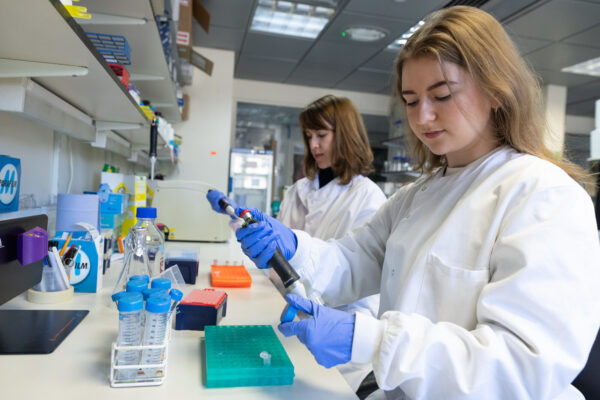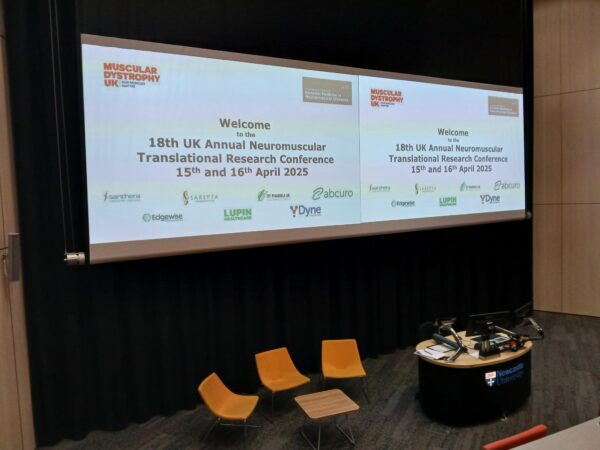On 24 January 2023, after this article was originally published, we were informed by NHS England that they will exceptionally continue to fund Spinraza/nusinersen or risdiplam through the Managed Access Agreements (MAAs) for those patients accessing the Sapphire trial. This is a welcome update and we are working with other patient groups and clinicians to continue engagement on the wider issues raised in the article below.
Clinical trials to enhance treatments for SMA open in the UK but facing major challenges

Several eagerly anticipated trials are investigating the clinical effectiveness of new treatments that will work in combination with those that focus on the role of SMN protein in SMA (nusinersen, risdiplam and zolgensma).
You can read about these new ‘anti-myostatin’ treatments and the results of trials to date on this page (https://smauk.org.uk/drugs-currently-being-tested-in-clinical-trials). Patient groups have been working with Clinical leads from three of the UK centres to find out what’s happening in the UK and jointly bring you this report:
- Which UK Centres are or will be taking part in these new trials
- How a decision by NHS England has severely limited who can apply to take part
- Why we are gravely concerned by this decision
- What are patient groups and clinicians doing about it?
- Which UK Centres were selected to take part in which of these new trials?
Centres have been working hard to set up these new trials so that members of the UK SMA Patient community who meet the trial eligibility criteria might be able to take part. As is always the case, this requires a heavy investment of time and energy by clinicians and large teams of experts who explore the scientific, ethical and legal aspects of running the trials.
These trials are multi-centre and are being offered in a number of countries. There is a total target number for each trial, so recruitment is competitive. As of today’s date, the tables below summarise which UK Centres are involved in the trials and the stage each Centre has reached. Note that a ‘cut off’ date’, if listed, refers to the overall trial. If places are filled by other countries, recruitment will close before this date.
| Sapphire Trial of Apitegromab funded by Scholar RockApplicant must be:· receiving risdiplam or nusinersen· non-ambulant· age 2 – 21 years.For more detail about the trial visit clinicaltrials.gov | ||
| Trial Centre | Current status /Contact | Cut off date |
| Leeds | Recruiting. aaidah.patankar@nhs.net | March – April 2023.Internationally competitive recruitment. |
| Oxford | Approved – at set up stage | |
| Great Ormond Street | Approved – at set up stage | |
| Liverpool | Approved – at set up stage | |
| Manatee Trial of RO7204239 funded by RocheApplicant must be:· receiving ridsiplam (patients on nusinersen can shift and receive non-commercial risdiplam through the study)· ambulant (inclusion criteria might be broadened in the future)· age 2-10 years For more detail about the trial visit – clinicaltrials.gov | ||
| Trial Centre | Current Status/Contact | Cut Off date |
| Oxford | Recruiting.laurent.servais@paediatrics.ox.ac | None specified. Internationally competitive recruitment |
| Newcastle | Approved at set up stage | |
| GOSH | Approved at set up stage | |
| Resilient Trial of Taldefrobep AlfaApplicant must be:· receiving risdiplam or nusinersen or have received zolgensma more than 2 years ago· ambulant or non-ambulant· age 4-21 yearsFor more detail about the trial visit – clinicaltrials.gov | ||
| Trial Centre | Current status | Cut off date |
| Glasgow | Approved at set up stage | November 2023Approved – at set up stage |
| Oxford | Approved at set up stage | |
| Manchester | Approved at set up stage | |
- How, unless it is reversed, a decision by NHS England and NICE will continue to severely limit who can apply to take part in clinical trials
If you live in England, it is only possible to receive treatment with nusinersen or risdiplam if you are signed up to the relevant Managed Access Agreement (MAA). These agreements are put in place when the National Institute of Health and Care Excellence (NICE) has judged that a treatment shows promising potential but consider there is still significant uncertainty in the clinical evidence. MAAs are in place for a limited time, usually a few years, so that further evidence is collected to assess the long-term benefits of each drug.
NHS England and NICE have advised the lead clinicians and Patient Groups that in their view, the MAAs for nusinersen and risdiplam prevent those enrolled in one of these treatment programmes from taking any other therapeutic agent. This includes an ‘agent’ that is a medication being investigated as part of a clinical trial.
To be included in one of these new clinical trials, you have to be receiving either nusinersen or risdiplam (or in some cases have received zolgensmaTM– (see table above). However, if patients withdraw from their MAA, in order to take part in a clinical trial or access another treatment there is no other way of accessing these SMN2 disease modifying drugs.
We understand that the relevant authorities in Northern Ireland and Wales also follow this advice.
This decision by NHS England creates challenges that are unique to the UK. The direct consequence is that the UK may no longer be able to have a leading role in these trials.
Read NHS England’s current statement in full
| This effectively means:If you think you or your child meet the clinical eligibility criteria for one of these trials, you are welcome to contact one of the open trial Centres (Leeds or Oxford) to express your interest provided:· your SMN disease modifying treatment is funded by NHS Scotland· your SMN disease modifying treatment is not funded via an MAA and you are a UK resident· you live in the Republic of Ireland as the Common Travel Agreement (https://www.gov.uk/government/publications/common-travel-area-guidance/common-travel-area-guidance) ensures access to healthcare for Irish citizens post Brexit.If your treatment with nusinersen or risdiplam is funded by NHS England or the NHS in Northern Ireland or Wales, even if you meet all the eligibilty criteria for a ‘combination treatment’ trial you cannot currently be considered for it. The only exception today is for ambulant patients who are under 10 years of age who could be considered for the Manatee Trial because the drug company running the clinical trial also manufactures risdiplam |
- Why we are gravely concerned by this decision
The NHS England and NICE decision that anyone who has nusinersen or risdiplam funded via a Managed Access Agreement (MAA) will no longer be eligible for NHS funding if they join a clinical trial creates several significant concerns, which are outlined below:
Consent and Data Collection
- Lead clinicians and Patient Groups signed overarching consent to the terms of the MAAs. Individually patients have signed consent for treatment. ‘Informed consent’ is essential when there is a contract. Nowhere was it highlighted that enrolment in the MAA would prevent participation in clinical trials of novel therapies.
- Each updated MAA now describes that the treatment (nusinersen or risdiplam) may only be given as a ‘monotherapy’, but the term ‘monotherapy’ is not defined. It was generally understood that this referred to a requirement that a patient may only receive one SMN-dependent therapy at a time. This wording was not part of initial Nusinersen MAA (July 2019), and was only introduced in February 2022. Version 2 of the Nusinersen MAA after the Risdiplam MAA was introduced in December 2021.
- An MAA’s purpose is to collect clinical and cost effectiveness data where there is uncertainty about the risk/benefit of a novel therapeutic intervention so that the National Institute of Health and Care Excellence (NICE) can, when the MAA ends, make an informed recommendation for future funding. This is not disputed, and data needs to be as ‘clean’ as possible. However, people receiving nusinersen or risdiplam through the MAA process are not in a clinical trial. Many will be receiving other prescribed drugs for various reasons. Physiotherapy input will vary greatly between people as will their day-to-day activity levels, diets etc. These and other factors that may impact on outcomes are not controlled for in the data collection.
- Approximately 5% of the total number of patients enrolled on the nusinersen and risdiplam MAAs would be eligible for these combination trials. Their data could be removed from the main data collection with little or no impact on the overall finding, which will anyway be supplemented by other global data collection.
Equity of Access
- If people receiving nusinersen or risdiplam through the MAA process cannot take part in a clinical trial, enrolment into the trials will not be based on clinical criteria/priorities but will depend on where a person lives – people living in England, Wales and Northern Ireland will not be able to take part in the clinical trials.
- People in the UK who have received Zolgensma – the ‘one off’ gene therapy treatment that is not subject to an MAA in England are not subject to the same limitations as those who receive nusinersen or risdiplam through a MAA.
- These inequities will last until at least 2025 when these MAAs end.
- Evaluating further treatments as part of a controlled clinical trial is the ‘next step’ in optimizing care and quality of life for those living with SMA. Denying groups of people the right to participate in these studies refuses them the right to strive towards better outcomes.
- The limits placed on patient opportunities may lead to decisions to join trials overseas bringing with it safety and financial impacts.
- One of the companies involved in these trials is also the manufacturer of one of the SMN-dependent treatments prescribed via MAA. This decision could inadvertently give them a competitive edge as the only company to be able to conduct a trial of an ‘antimyostatin’ drug across the UK.
Financial, reputational, safety and future investment issues
- Trial sites in the UK have already invested a significant amount of time and energy setting up specific trials
- Working to set up a trial that never happens is detrimental to morale and makes it harder to recruit and retain expert staff to run clinical trials.
- The trials present no additional cost to the NHS. All costs relating to the investigational drugs are covered by the pharmaceutical and biotech companies carrying out the trials.
- The reputation of the UK as a centre for neuromuscular research could be significantly undermined because companies will not see the UK as a reliable country to carry out clinical trials. This goes against the recommendations set out in the 2022 England Rare Disease Action Plan, which states that “By working in partnership across the NHS, regulators, research funders, industry, medical research charities, academia, and government, we can create a clinical research ecosystem which is more efficient, more resilient, and more effective than ever before.”
- The UK might no longer be attractive to leading clinicians and researchers because the opportunities to be part of exciting clinical research are limited.
- In the longer-term NHS, NICE and UK Centres will not have any clinical experience with these new drugs which will impact on the efficiency of appraisals and recommendations including the availability of expert clinical advice and the roll out of any potential treatment programme.
- What are patient groups and clinicians doing about this?
- The Principal Investigators from the Trial Centres have met with representatives from NHS England and NICE and raised all the above points.
- Similarly, the Patient groups have written to these representatives asking for an urgent face to face meeting of all parties.
- The Patient Groups are alerting other Rare Disease Groups that have, or may have, a treatment for their community funded via an MAA, of the issues it raises. We have asked NHS England and NICE to meet with all these groups and appropriate clinical representatives to discuss the issues.
- Clinicians and Patient Groups have asked Pharmaceutical Companies to advise NHS England and NICE what impact they consider the current agreements will have on their future interest in the UK as a market for future trials and drug development.
On 22nd December 2022 NHS England advised us they were,
‘committed to taking your responses on board, including any wider implications, and are taking legal advice on this matter’.
We were advised on 17th January 2023 that this advice is now being worked through and we will be notified of the outcome as quickly as possible.
As soon as we know we will update the community.


